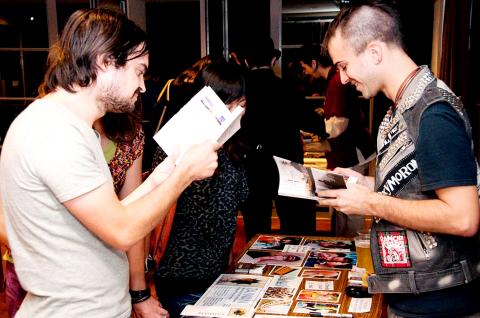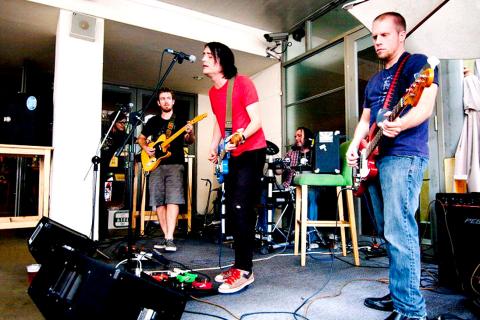Shawn May and Felicia Rodrigues have a plan to liven up a Saturday afternoon in Taipei. The expat artists are holding Exposure, an outdoor art fair that takes place tomorrow in the courtyard of Taipei Artist Village (台北國際藝術村百里廳).
May, who has lived in Taiwan for two and a half years, sums up Exposure as the perfect day of leisure. “What’s better than great art, live music, excellent food and a day drinking in the sun?” he told the Taipei Times.
May and Rodrigues initially started Exposure as a way to showcase their work, as well as that of like-minded artists. May specializes in gig posters and T-shirt design. Rodrigues says she left Toronto for Taiwan three and a half years ago because she was looking for “inner growth and experience.”

Photo courtesy of Felicia Rodrigues
“When I first came to Taiwan, I really didn’t know what was going on in the art scene,” she said. “But since moving here, my art has blossomed and I’m quite impressed with what Taiwan has brought out of me.”
The pair held the first Exposure in June last year to rave reviews, which led to a second one in October. The event also features live music (tomorrow there will be four acoustic artists). They met only shortly before the first event, but quickly clicked as a team.
“We split the duties to get everything ready,” May said. “Felicia is fantastic in dealing with all the artists. She handles getting all of their deposits [for the venue]. I deal with the venue and making sure we get all the right equipment lined up. I’m the nuts-and-bolts guy; she’s the people person.”

Photo courtesy of Felicia Rodrigues
The DIY effort behind the event has been personally gratifying for Rodrigues.
“Many artists, myself included, had never done an art show or gallery, so there were many questions to answer,” she said. “As I was checking out the artists’ profiles, I was truly amazed and inspired with everyone’s skills. I got to meet a lot of amazing people that had interesting thoughts and ideas. Bringing together 22 artists is a little nerve-racking and hard work, but worth it in the end. It makes me happy to see that the reason Exposure was created is reality.”

Google unveiled an artificial intelligence tool Wednesday that its scientists said would help unravel the mysteries of the human genome — and could one day lead to new treatments for diseases. The deep learning model AlphaGenome was hailed by outside researchers as a “breakthrough” that would let scientists study and even simulate the roots of difficult-to-treat genetic diseases. While the first complete map of the human genome in 2003 “gave us the book of life, reading it remained a challenge,” Pushmeet Kohli, vice president of research at Google DeepMind, told journalists. “We have the text,” he said, which is a sequence of

On a harsh winter afternoon last month, 2,000 protesters marched and chanted slogans such as “CCP out” and “Korea for Koreans” in Seoul’s popular Gangnam District. Participants — mostly students — wore caps printed with the Chinese characters for “exterminate communism” (滅共) and held banners reading “Heaven will destroy the Chinese Communist Party” (天滅中共). During the march, Park Jun-young, the leader of the protest organizer “Free University,” a conservative youth movement, who was on a hunger strike, collapsed after delivering a speech in sub-zero temperatures and was later hospitalized. Several protesters shaved their heads at the end of the demonstration. A

Every now and then, even hardcore hikers like to sleep in, leave the heavy gear at home and just enjoy a relaxed half-day stroll in the mountains: no cold, no steep uphills, no pressure to walk a certain distance in a day. In the winter, the mild climate and lower elevations of the forests in Taiwan’s far south offer a number of easy escapes like this. A prime example is the river above Mudan Reservoir (牡丹水庫): with shallow water, gentle current, abundant wildlife and a complete lack of tourists, this walk is accessible to nearly everyone but still feels quite remote.

In August of 1949 American journalist Darrell Berrigan toured occupied Formosa and on Aug. 13 published “Should We Grab Formosa?” in the Saturday Evening Post. Berrigan, cataloguing the numerous horrors of corruption and looting the occupying Republic of China (ROC) was inflicting on the locals, advocated outright annexation of Taiwan by the US. He contended the islanders would welcome that. Berrigan also observed that the islanders were planning another revolt, and wrote of their “island nationalism.” The US position on Taiwan was well known there, and islanders, he said, had told him of US official statements that Taiwan had not